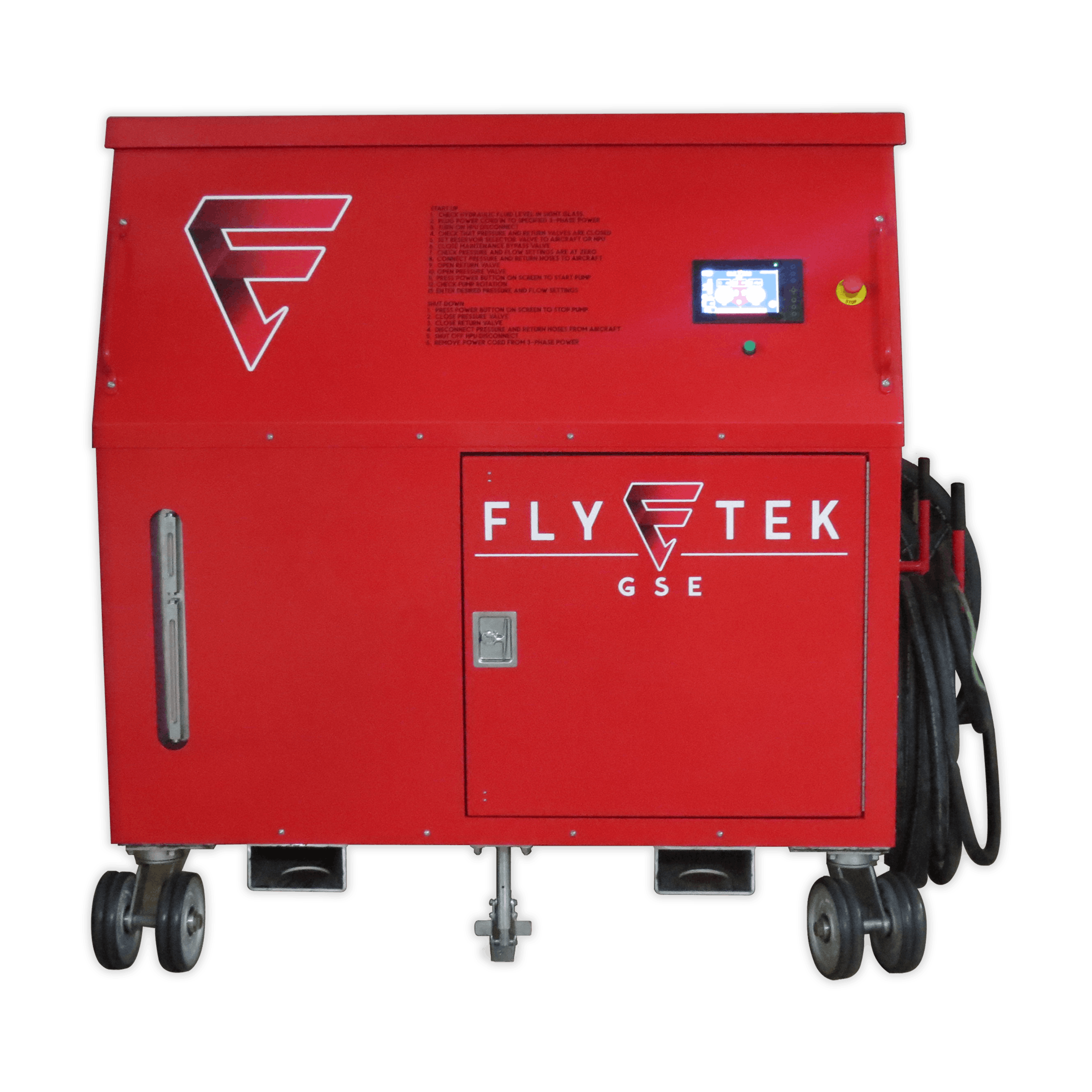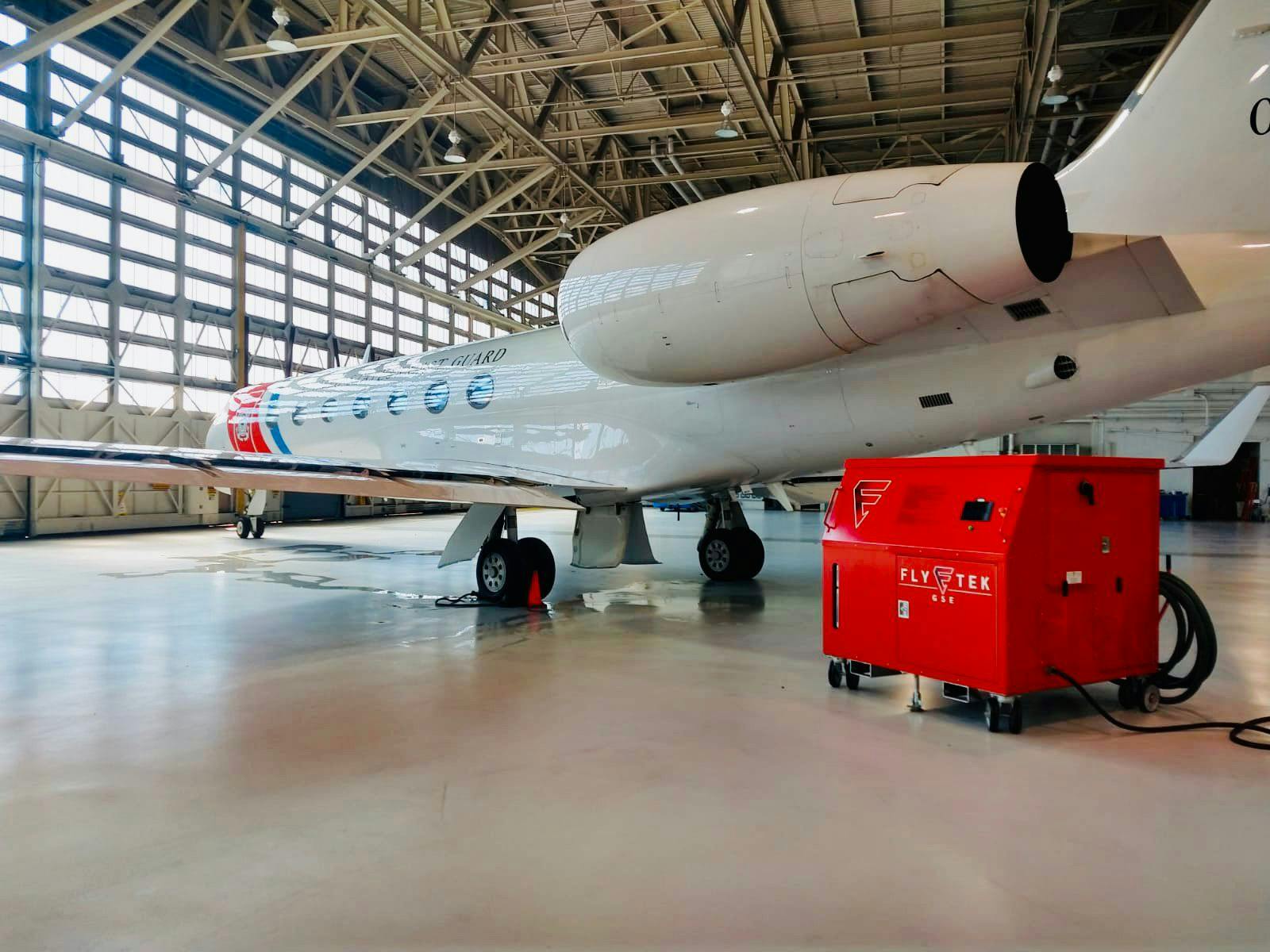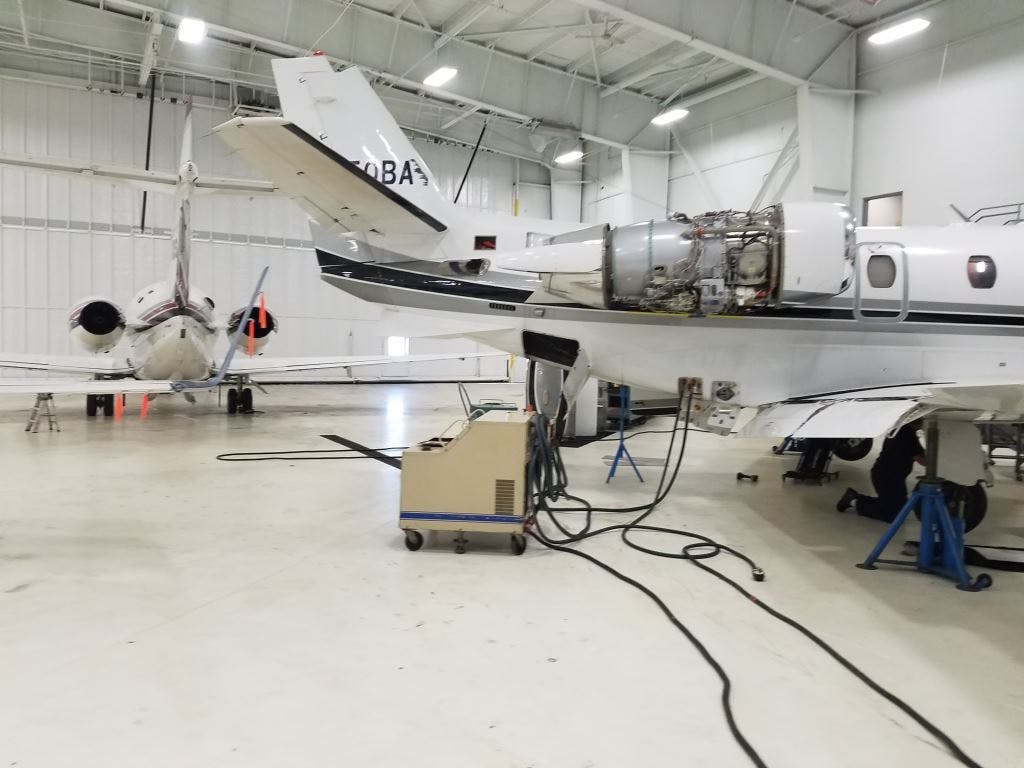Without a hydraulic power unit, many aircraft maintenance operations wouldn’t be possible. But when it’s time to select a new unit, what features should you consider? In this guide, we’ll take a closer look at the function and features of a hydraulic power unit and show you what to look for.
What is a Hydraulic Power Unit?

A hydraulic power unit (HPU or mule) is a type of portable ground support equipment that supplies auxiliary hydraulic power to the aircraft. It generally consists of an electric or engine-driven motor, pump, fluid reservoir, filtration system, and cooling system.
How Does a Hydraulic Power Unit Work?
Hydraulic power units come in a variety of configurations, and their exact characteristics and specifications will dictate the type of projects that the HPU can be used for. But despite these differences, HPUs operate on a common set of principles.
HPUs rely on multi-stage pressurization networks to move fluid. The movement of this enclosed fluid can be used to transfer energy from one source to another. This energy transfer can then be converted into force or mechanical motion.
Hydraulic Pressure Units and Ground Support Equipment
Hydraulic power units are commonly used as ground support equipment because of their high power output and range of applications. HPUs are generally used for the following:
- Checking aircraft hydraulic systems
- Draining aircraft hydraulic systems
- Filtering aircraft hydraulic fluid
- Refilling aircraft hydraulic fluid
Hydraulic power units can be used for a variety of commercial, business, and general aviation aircraft. These applications make them an essential feature for aircraft maintenance shops.
How to Select the Right Hydraulic Power Unit
The “right” hydraulic power unit depends, of course, on the size and type of the job and the aircraft you’re working on. Generally, you should consider factors such as:
- Pressure limits
- Power capacity
- Reservoir volume
- Unit size
- Power supply
- Pumping strength
You may also need to consider the sizes of your outlet and inlet hoses, which can affect pumping capacity and overall power.
Features to Look for in a Hydraulic Power Unit

In addition to these general considerations, you may also wish to consider the additional features built into many of today’s HPUs. These features include:
Power Unit Controllers
The hydraulic control unit provides the user interface for using your HPU. Typically, this controller is built directly into the power unit. It will contain power switches, displays, and other features to allow you to monitor the unit.
A power unit controller will be necessary when integrating the HPU into a hydraulic system.
Accumulators
As the name suggests, accumulators are designed to collect water from the pumping mechanism. This allows you to build and maintain fluid pressure, which can supplement the motor pumping system.
Accumulators are containers that can be found attached to the hydraulic actuators of your HPU.
Tanks
The tanks on an HPU are designed to allow fluid from the drainage pipes to drain into them. Occasionally, actuator fluid may also need to be drained into these tanks, so it’s important that the tanks have enough volume to accommodate this fluid.
Motor Pumps
Hydraulic power units can have a single motor pump with its associated accumulator valve. However, some HPUs can be equipped with multiple devices, each having a separate accumulator valve. When multiple pumps are present, one pump usually operates at a time.
Filters
Filters are typically found at the top of the HPU tank. A filter is actually a self-contained bypass unit, possessing its own motor, pump, and filtering apparatus. A filter also includes a multi-directional valve that can be used to fill or empty the tank.
In many cases, the filter can be changed while the HPU is functioning, since it is a self-contained system.
Coolers & Heaters
HPUs require careful temperature regulation. Therefore, many units include an air cooler behind or near the filter unit, which can prevent temperatures from rising above the manufacturer’s specifications.
If it’s necessary to elevate temperatures, some units have a heating system (e.g., an oil-based heater).
Selecting the Right Hydraulic Power Unit Motor

One of the biggest considerations when selecting a hydraulic power unit is the motor, which provides the power for the HPU as a whole.
Generally, you’ll want to select a motor that’s size, speed, and power capacity complement the HPU you’re using it on. Choosing a motor that’s too large can burn out your HPU, while a motor that’s too small can strain the components of your HPU and reduce efficiency.
When selecting a motor for your HPU, you should consider the following:
Motor Size
Motor size will generally be measured as follows:
- Horsepower
- Gallons per minute
- Pressure
- Mechanical pumping efficiency
How do you know your motor is the right size?
Some motors will describe their horsepower as the root mean square (RMS), which provides more of a snapshot of the motor’s performance at different levels in the pumping process. However, your motor should have enough torque required for the highest pressure level in the cycle.
Make sure to double-check your manufacturer’s performance charts to ensure that these measurements meet the performance requirements of your HPU.
Fuel Source
An HPU motor can be electric, gas, or diesel. Electric motors offer greater initial torque, though diesel and gasoline motors can offer more even performance at both high and low running speeds.
However, if you choose a gasoline or diesel-powered motor, you will need to select a motor with a power rating that’s at least double that of an electric motor.
Bottom Line
The right HPU depends entirely on the aircraft specifications. Matching the capacity and features of your HPU can ensure that your equipment stays in peak condition.
Let FlyTek Help with Your GSE
At FlyTek, we have experience in working with a variety of equipment manufacturers. If you have any additional questions about selecting an HPU, we’d love to help! We can even set up a maintenance plan to help you get the most from your equipment so that you can stay focused on the task on the ground.

